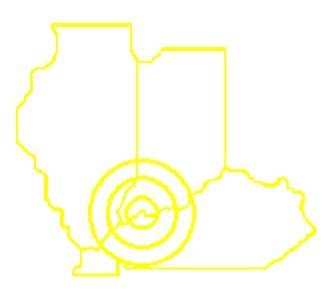(continued from Vanderburgh County, Indiana, in the Mexican War, page 2)
company. Without Joseph Lane and Doctors Lane and Walker there were 80 men, and it has been said that when the company left Evansville it lacked twenty men of being complete. But this misleading statement has been based upon the false assumption that at the time one hundred men were required to make a complete company. According to an order sent out by the adjutant-general of Indiana a complete company should consist of 13 officers and 64 privates, or 77 in all, and it was advised that four or five more should be enlisted to make up for a probable deficiency by reason of possible rejections by the inspecting officer. In keeping with this order Captain Walker’s company was raised. Later it was learned that by an act of Congress, enacted May 13, 1846, a complete company should consist of 13 officers and 80 privates, but it does not appear that all Indiana companies, if any, were raised and mustered into the service up to this standard.
Complete muster-in and muster-out rolls were never filed with the adjutant-general of either Indiana or the United States army, and for many years this was a source of continual complaint. It finally became the special duty of the adjutant-general of Indiana to gather from all available sources information as to the record of Indiana in the war “with Mexico and to publish the same. This task fell to Oran Perry, as adjutant-general of the state, and after repeated appeals to the War Department at Washington, D. C., he was rewarded, the auditor of the department.Waving [sic] the rule that forbid [sic] giving out information, provided Mr. Perry with such record as was on file in the department. But the record is far from being complete. It appears to have been rnade up from final pay-rolls filed with the department, and is evidenced by a reference to the record of Captain Walker’s company. The record lists George W. Peck as captain of the company and makes no mention of Captain Walker save in the list of deaths, not even showing that Walker was ever captain of the company. Peck was captain of the company when it was mustered out of the service, hence the conclusion that the record provided by the War Department was made up from final pay-rolls.
This record gives no description of the volunteer as to his age and place of residence at the time of his mustering in, hence it is impossible to tell the county to which he belonged. Further difficulty of identification arises when names found in the record and elsewhere are compared, and removed to this late date when this or that record cannot be verified [;] we find it impossible to determine whether the name Bell or Beall is correct, Ferres or Farris, Forster or Foster, Haag or Hang, Hervey or Hewey, Wilhoit or Wilhite. It is equally impossible to tell just how many men constituted Captain Walker’s company when it was mustered into the service, or whether all who enlisted when the company was raised were mustered into the service. The War Department record accounts for but 78 men of this company, and three of these, James J. H. Edwards, James H. Smith, and William R. Bell, cannot be identified as being from Vanderburgh county. Perhaps the name William R. Bell should be William A. Beall, the latter name not being mentioned in the record, as are not mentioned George W. Conner, George Peachey, Thomas Nolan and James Sanders who were among the men enlisting at the time Captain Walker raised his company.
From a letter written at Fort Clark by A. F. Morrison and addressed to the Indiana Democrat the following extract is taken:
A novel and exciting incident occurred in Captain Walker’s company of Evansville. After the inspection and by a mere accidental circumstance which happened in (continued next page)

